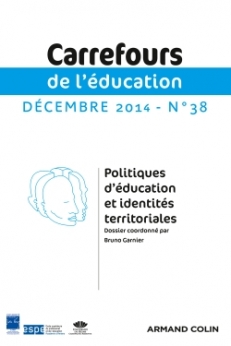
Carrefours de l'éducation n° 38 (2/2014)
Pour acheter ce numéro, contactez-nous
Recevez les numéros de l'année en cours et accédez à l'intégralité des articles en ligne.
Des « petites patries » aux « patrimoines culturels » : un siècle de discours scolaires sur les identités régionales en France (1880-1980) L’analyse des manuels primaires et des instructions officielles de la IIIe République a mis en évidence l’affection républicaine pour les petites patries. Si les républicains revendiquent la mission de francisation attribuée à l’école par la Révolution, l’éveil du patriotisme dans la France des années 1880-1930 s’est fondé sur le renforcement du sentiment d’identité locale. L’article rappelle les caractéristiques de ce discours scolaire, qui consacre la patrimonialisation des traditions populaires, tout en leur déniant toute forme d’autonomie politique ou sociale. La prégnance de ces représentations s’observe dans la reprise qu’en font le régime de Vichy et les mouvements régionalistes eux-mêmes. Cependant, à partir des années 1950, ce discours scolaire entre en obsolescence, du fait des transformations socioéconomiques qui affectent les régions françaises, mais aussi des réformes structurelles de l’enseignement. Néanmoins, à partir de 1977, le danger de captation desréférences aux identités culturelles par des mouvances régionalistes détermine le ministère de l’Éducation nationale à réactiver un discours intégratif sous forme d’une valorisation des patrimoines culturels régionaux.
From “Petites Patries” (Regional Countries) to “Patrimoines Culturels” (Cultural Patrimonies) : a Century of Educational Discourse Regarding Regional Identities in France The analysis of primary school primers and of the Third Republic’s official instructions has shown the affection states-men of the Republic had for “petites patries” or regions small in size and strong on identity. If the Republic adopted the “frenchification” mission attributed to the schools by the Revolution, the birth of patriotism in France between 1880 and 1930 grounded itself in the reinforcement of a feeling for local identities. This paper rehearses the characteristics of this particular educational discourse, which oversees the transformation into patrimony of popular traditions while denying them any genuine social or political autonomy. The strength of these representations can be seen in their adoption by the Vichy regime and by the regional movements themselves. However, starting in the 1950s, these representations become obsolete, due to the socio-economic transformations that affect the regions of France, as well as to structural reforms in the teaching system. Nonetheless, starting in 1977, the danger of seeing references to cultural identities co-opted by regionalist movements led the Ministry of Education to resurrect a discourse of integration, which takes the shape of highlighting regional cultural patrimonies.